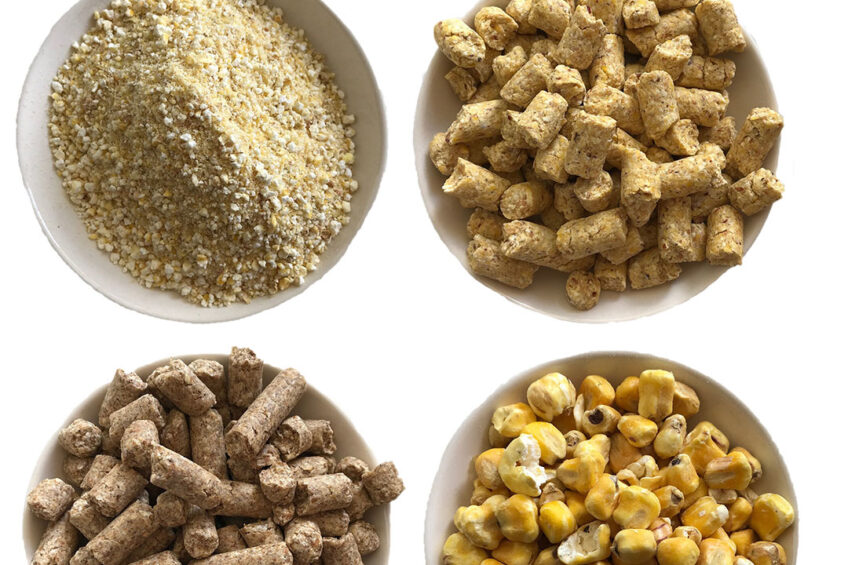- This topic is empty.
- AuthorPosts
- Machi 9, 2025 at 12:03 um #587028

Feeding pigs is one of the most important aspects of pig farming, as it directly affects the health, growth, and productivity of the animals.
The type and quality of feed provided to pigs play a significant role in ensuring that they grow efficiently, remain healthy, and reach their market weight within the desired timeframe.
Different stages of a pig’s life require specific types of feed to meet their nutritional needs. This article will explore the different kinds of feeds for pigs and how each type contributes to the overall well-being of the animals.
1. Starter Feed
Starter feed is specially formulated for piglets, typically from weaning age (about 3 to 4 weeks) to 8 weeks old.
At this stage, piglets are transitioning from milk to solid food, and starter feed is designed to support their rapid growth and development. Starter feeds are rich in protein and energy to ensure that the piglets gain weight quickly and have the strength to thrive in their new environment.
The feed usually contains easily digestible ingredients such as cereals, soybeans, and whey proteins, providing a balanced diet that includes the essential amino acids and vitamins piglets need for proper growth. Starter feeds may also contain probiotics to help develop healthy gut flora and improve digestion.
2. Grower Feed
Grower feed is provided to pigs after they have transitioned from starter feed and are typically fed from 8 weeks of age until they reach about 16-20 weeks old.
This type of feed is designed to support continued growth during the intermediate stage of development. Grower feeds are typically lower in protein than starter feeds but still provide the necessary nutrients for pigs to gain weight efficiently.
The ingredients in grower feed include grains such as corn and wheat, as well as plant-based proteins like soybean meal. The goal of grower feed is to help pigs build lean muscle mass and prepare them for the next phase of growth, where they will begin to approach their market weight.
3. Finisher Feed
Finisher feed is used for pigs in the final phase of growth, typically from around 16-20 weeks of age until they reach their market weight, which is usually between 250 to 300 pounds (113 to 136 kilograms).
At this stage, pigs need a diet that supports optimal weight gain and body condition. Finisher feed is lower in protein compared to starter and grower feeds, but it is higher in energy to ensure that the pigs accumulate the necessary fat and muscle mass for slaughter.
The composition of finisher feed often includes more grains, such as corn, and higher levels of energy-dense ingredients. The aim of finisher feed is to maximize weight gain while maintaining overall health, preparing the pigs for market.
4. Breeder Feed
Breeder feed is designed for adult pigs, particularly sows (female pigs) and boars (male pigs), that are used for breeding. The nutritional requirements of breeding pigs are different from those of growing pigs, as they need specific nutrients to support reproduction and lactation.
Breeder feed is rich in protein, vitamins, and minerals to ensure that sows and boars are healthy and productive. For sows, breeder feed provides the necessary nutrients for successful pregnancy, and it supports milk production when they are nursing piglets.
For boars, breeder feed helps maintain sperm quality and fertility. The formulation of breeder feed includes balanced levels of energy, protein, and essential fatty acids to maintain good reproductive health and productivity.
5. Supplementary Feeds
In addition to the main feeds, supplementary feeds are sometimes used to address specific nutritional needs or to enhance the performance of pigs. Supplements can include vitamins, minerals, amino acids, or other specific nutrients that may be lacking in the pigs’ regular feed.
For example, calcium and phosphorus supplements are often added to support strong bone development in growing pigs.
Similarly, pigs may be given additional protein sources like fish meal or blood meal if there is a need to enhance their muscle growth. Additionally, some farmers use vitamin and mineral supplements to improve overall health and immunity in their herd, helping to prevent diseases and promote better feed conversion efficiency.
In conclusion, providing the right kind of feed for pigs at each stage of their life is crucial for their growth, health, and productivity.
From starter feeds for piglets to finisher feeds for market-ready pigs, each type of feed is formulated to meet specific nutritional needs.
Additionally, breeder feeds support reproduction and health in adult pigs, while supplementary feeds ensure that any nutritional gaps are filled. By understanding the different kinds of feeds and their benefits, farmers can make informed decisions to ensure the well-being and success of their pig farming operation.
- AuthorPosts
- You must be logged in to reply to this topic.

